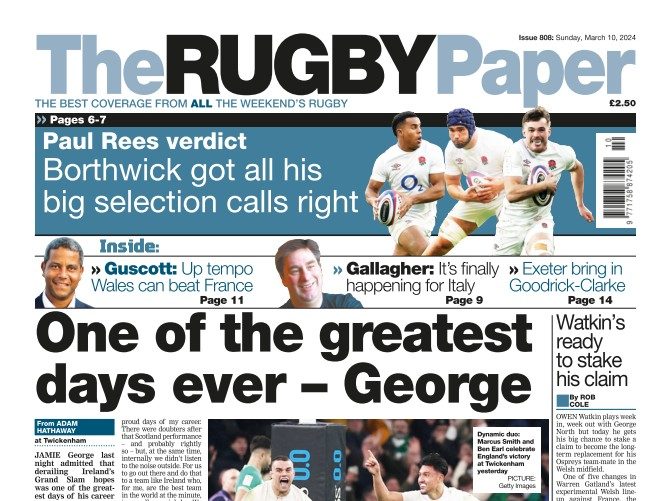“Rugby is a thugs’ game played by gentlemen.”
No one really knows who the first person to utter this old saying was, but anyone who has seen rugby being played live and follows news of the sport, can testify to its truth. Ever since that first fateful day when a boy at Rugby school in England picked up the ball with his hands and ran with it across the field, the sport has gone through glorious years, enjoying a high-end status on and off the pitch, peaking in popularity in a number of countries. Players became heroes and the very word instilled an idea of passion and grit, unlike anything found in other sports.
However, mounting concerns on the decrease in youngsters choosing it as their main sport has put all that’s been happening to the rugby union under the lens. It is imperative to stop and consider all that’s happening around the world, removed from any glamour and dissected for better understanding. It is undeniable that tensions are rising, culminating in particular hotspots of unrest. Today we’ll be discussing this and, if we may, an attempt at figuring out exactly what is going on behind-the-scenes of one of the world’s fiercest sports
Player Burnout
The most essential of resources which make the game what it is, the player, has come under a tonne of pressure, affecting performances and impacting injury frequency. Perhaps the message is most clearly poignant when it comes from the victim’s own mouth. Back-row Saracens player, also part of the English national team, Billy Vunipola has just sustained yet another injury, forcing him into a four-month absence form the pitch and which will probably exclude him from the start of the Six Nations Cup. Vunipola has just returned from knee and shoulder trouble, an alarming record for the twenty-four year old. In his statement after his latest knee injury, he warns,
“Kids want to play rugby because it’s fun, but they also need to know that it’s tough, and it’s normal to have surgery at 25 because you’re so worn down.
He is, of course, right. Some things need to change or give, if we want our players to stick around for longer. To undergo two surgeries in a year and for this to be considered normal, is beyond many people’s understanding. Naturally, there is love for the game and this is what Vunipula also stresses, but the pressure is too high. He would gladly take a pay-cut, he admits, and play fewer games, than keep sustaining injuries which will burnout players quicker than anything ever will. A solution to this would obviously be to cut down on the games or to rotate players so that even the top players are not expected to make an appearance in each and every game. Of course, this becomes a problem when you can’t find enough players…
Popularity Shift
With the rise in popularity of soccer, every other sport has had to take a back seat – including rugby. In certain countries however, this has been more keenly felt. Australia, where – historically speaking – rugby has always enjoyed a popular status, has seen numbers plummet both in participation and attendance. But could it just be due to soccer’s fame as the beautiful game which is deterring youngsters from playing? Or perhaps the burnout mentioned previousl, a burnout which players will imminently suffer once they elect to play professionally? While Australia-facing bookmakers still enjoy widespread popularity on rugby league betting – due perhaps to a wide range of rugby league betting types which go beyond the basic market – this seems to be the only thriving aspect in a field which is struggling to make ends meet. It is our belief that the ARU (Australian Rugby Union) will have much on its hands before this is over. They need to find a way to make the sport more relevant for the country and to instil a sense of pride in the average Australian citizen wearing the Wallaby shirt. Because at the moment, you’ll be extremely hard pressed to see anyone even wearing the Rugby shirt in the first place.
Changing Formats
To touch base on something still close to the land Down Under, and which might also yield insight into the why there is such a fall in popularity, is the matter of the umpteenth change in format for the Super Rugby competition. This competition was changed from a 15-team event into an 18-team event for 2016 and 2017, to go back to 15 for next year’s round of inter-conference matches.
The organisers realised the event was spread over too thinly, touching on too much of a variance in levels for there to be real competition. They reduced it to a 15-team format in the hope of attracting more viewers to the competition which has seen numbers dwindling over the last few years.
Geopolitical Tension for the Rugby World Cup in Japan
In 2019, the Rugby World Cup will be held in Japan and yet, preparations for the event are slow to say the least. In the first instance, Japan’s geographical location next to North Korea is too close for comfort. France has already said that it will pull back its team if security of the 2018 Winter Olympics in South Korea is at risk, being the first nation to make such a proclamation. We wouldn’t be surprised if, should the situation escalate, the same is done for the Rugby league.
Other than that, there’s also the fear that, once again, there are only a couple of real contenders to the title. When Springboks lose 57 – 0 to the All Blacks, you know something needs to change quickly, if you want to have people watching from home and in the stands. Or else it will all just be the same predictable melee it has been for the past few years.
Hone the Skills. Hone the Passion.
While it is all well and good for people like us to sit comfortably and criticize, it is imperative that we appreciate the hard work and the years which take to achieve any type of result. While France’s bid for the 2023 World Cup promises to breathe life back into a seemingly-stagnant sport, we need more countries to step up their game and to bring the passion back on the home screens (without forcing the viewer to pay to be able to watch the game), to advertise matches on national TV and to celebrate each and every national victory as they would for Soccer, for example.
The Gentleman’s game is far from being dead. It just needs a bit of reshuffling. By all means, hone the skills in our youngsters, but hone the pride. Make the teams relevant for the country again.
























